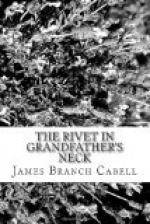Always in reverie the colonel would come back to this,—that Anne could not be thought of, quite, in the same frame of mind wherein one appraised other persons. Especially must he concede this curious circumstance whenever, as to-night, he considered divers matters that had taken place quite long enough ago to have been forgotten.
It was a foolish sort of a reverie, and scarcely worth the setting down. It was a reverie of the kind that everyone, and especially everyone’s wife, admits to be mawkish and unprofitable; and yet, somehow, the next still summer night, or long sleepy Sunday afternoon, or, perhaps, some cheap, jigging and heartbreaking melody, will set a carnival of old loves and old faces awhirl in the brain. One grows very sad over it, of course, and it becomes apparent that one has always been ill-treated by the world; but the sadness is not unpleasant, and one is quite willing to forgive.
Yes,—it was a long, long time ago. It must have been a great number of centuries. Matocton was decked in its spring fripperies of burgeoning, and the sky was a great, pale turquoise, and the buttercups left a golden dust high up on one’s trousers. One had not become entirely accustomed to long trousers then, and one was rather proud of them. One was lying on one’s back in the woods, where the birds were astir and eager to begin their house-building, and twittered hysterically over the potentialities of straws and broken twigs.
Overhead, the swelling buds of trees were visible against the sky, and the branches were like grotesque designs on a Japanese plate. There was a little clump of moss, very cool and soft, that just brushed one’s cheek.
One was thinking—really thinking—for the first time in one’s life; and, curiously enough, one was thinking about a girl, although girls were manifestly of no earthly importance.
But Anne Willoughby was different. Even at the age when girls seemed feckless creatures, whose aimings were inexplicable, both as concerned existence in general, and, more concretely, as touched gravel-shooters and snowballs, and whose reasons for bursting into tears were recondite, one had perceived the difference. One wondered about it from time to time.
Gradually, there awoke an uneasy self-conscious interest as to all matters that concerned her, a mental pricking up of the ears when her name was mentioned.
One lay awake o’ nights, wondering why her hair curled so curiously about her temples, and held such queer glowing tints in its depths when sunlight fell upon it. One was uncomfortable and embarrassed and Briarean-handed in her presence, but with her absence came the overwhelming desire of seeing her again.
After a little, it was quite understood that one was in love with Anne Willoughby....
It was a matter of minor importance that her father was the wealthiest man in Fairhaven, and that one’s mother was poor. One would go away into foreign lands after a while, and come back with a great deal of money,—lakes of rupees and pieces of eight, probably. It was very simple.




